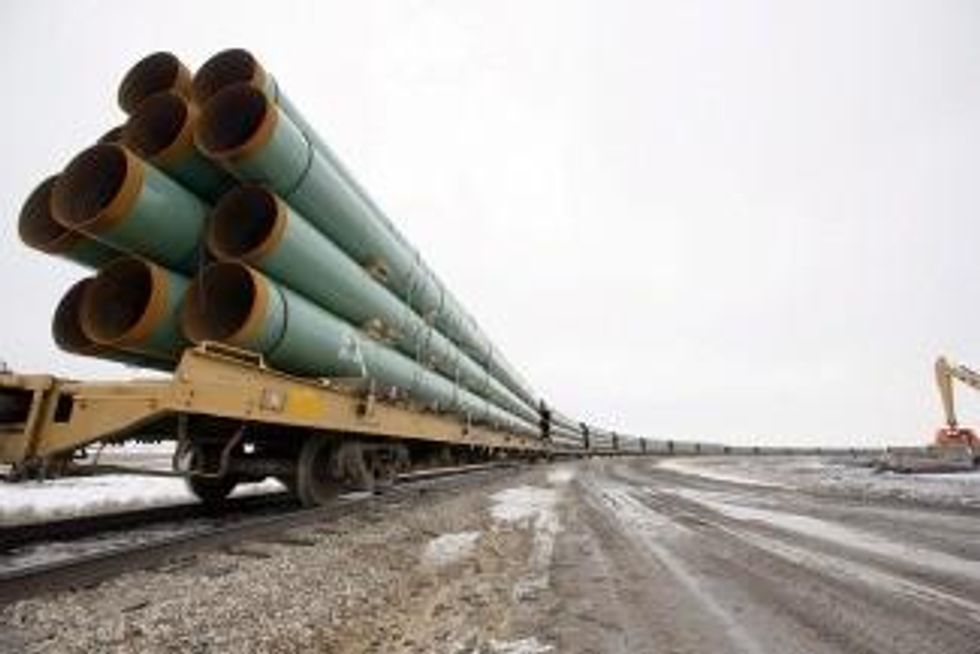This week the Senate is likely to vote on an amendment that would force approval for the Keystone XL pipeline. President Obama already rejected the dirty tar sands pipeline because it needed a more thorough safety and environmental review.
Yet instead of allowing engineers, public safety, and other experts to assess the pipeline's sweeping impacts--on American communities, drinking water supplies, and the stability of our climate--this amendment would let the politicians in Congress decide what is safe.
It would bypass our nation's long-standing environmental review process and give Congress the unprecedented authority to hand out permits on massive projects.
This amendment, sponsored by Senator John Hoeven (R-ND) and attached to a largely sensible, bipartisan transportation bill, is bad for government process and worse for America's national interest.
Pipeline supporters and their allies in Congress are trying to capitalize on rising gas prices by claiming the pipeline would lower prices at the pump. That is patently false.
The company behind Keystone XL, TransCanada, has admitted the pipeline would increase the price Americans pay for Canadian oil by up to $4 billion a year. It's no wonder oil companies want to build it.
In 2009, TransCanada told the Canadian government that Keystone XL is meant to relieve the oversupply of oil in the Midwest. By diverting oil to ports in the Foreign Trade Zone in the Gulf of Mexico, the pipeline would cause oil prices to rise in the Midwest which will likely mean consumers will pay more at the pump for their gasoline.
In other words, in addition to all the other forces driving up gas prices--tensions with Iran, supply disruptions in Libya and Sudan, a tripling of cars in China in the last five years--Republican lawmakers support a project that could increase gas prices even further for millions of Americans.
Importing oil from Canada has never helped America get off the oil price rollercoaster. Over the last 11 years, the amount of oil we bought from Canada increased 50 percent, yet gas prices have tripled over that same period, with ups and downs along the way.
America cannot control the long-term price of oil; it is set on a global market and shaped by global forces. But we can reject a dirty pipeline that would increase oil prices in the Midwest. And we can shield ourselves from future price hikes by embracing real transportation solutions.
Proven solutions like cleaner cars, sustainably grown biofuels, bus rapid transit and light rail systems, bike and pedestrian-friendly policies, and other transit options can end oil's monopoly on our economy and put money back in our pockets.
Smart policies can achieve that. President Obama has raised fuel economy standards to 54.5 miles per gallon by 2025. Within 20 years, better-performing cars will save drivers more than $80 billion a year at the pump while cutting our oil use by more than we imported from Saudi Arabia and Iraq in 2010.
Americans want these better performing cars. A Consumer Reports https://www.autoblog.com/2011/11/14/consumer-reports-large-majority-favor-stronger-fuel-econ/ that 80 percent of consumers agreed that "fuel economy standards should require auto manufacturers to increase the overall fleet average to at least 55 miles per gallon by 2025."
Drivers welcome these cars because they will save money. The Keystone XL pipeline offers no such benefits. Instead, on top of raising oil prices, it would fuel the destruction of Alberta's ancient Boreal Forest and threaten communities, water supplies, and farm lands along the entire pipeline route. And because producing tar sands oil produces three times as much global warming pollution as regular crude, it would intensify extreme weather and other hallmarks of climate change.
Climate change, pipeline oil spills, contamination of drinking water. This tar sands pipeline has grave implications that warrant careful consideration, not hasty political decisions.
President Obama already determined that the Keystone XL tar sands pipeline needs more review. The Senate must oppose any amendment to approve the Keystone XL tar sands pipeline. Congress must stand for accountability to public safety and the environment, not for higher profit margins for oil companies.




